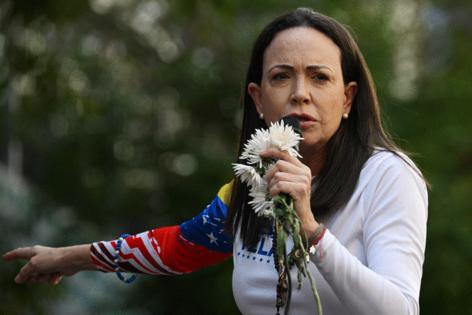Opposition leader Machado urges US to hold firm on Venezuela sanctions as Chevron pushes to stay
Published in News & Features
As Chevron seeks to persuade the Trump administration to allow it to continue producing oil in Venezuela, opposition leader María Corina Machado argues that such a move would be counterproductive, saying it would only serve to rescue strongman Nicolás Maduro from the precarious position he now finds himself in, thanks to sanctions imposed by the new administration.
Speaking on Fox News, Machado praised the Trump administration’s strategy, calling it effective and warning that reversing course would ensure the survival of a socialist regime deeply involved in drug trafficking and posing a security threat to the entire region.
Her remarks came after Chevron CEO Mike Wirth revealed that the company is in talks with U.S. officials to extend its license to operate in Venezuela. That license, which allows the Texas-based oil giant to produce crude despite sanctions, is set to expire in three weeks.
Earlier on Fox News, Wirth argued that Chevron’s withdrawal would leave a vacuum likely to be filled by Chinese and Russian companies.
But Machado firmly rejected that view.
“Frankly, I think it’s absurd — I don’t understand it,” she said on the interview on Sunday. “I believe President Trump’s decisions and strategy are absolutely correct and effective. It’s already working… Maduro is in his weakest position ever.”
She added that the U.S. should increase pressure to force Maduro from power.
“Remember, we’re not dealing with a simple dictator. Maduro is the head of a criminal structure that has turned Venezuela into a safe haven for drug cartels, guerrilla groups, and enemies of the Western Hemisphere — such as agents of Iran, Russia, and other international criminal organizations,” she said.
The debate comes as U.S. policy has taken a significantly tougher stance against Maduro’s regime. The shift began with the Trump administration’s decision to revoke licenses issued under President Joe Biden that allowed Chevron and other foreign companies to operate in Venezuela, bypassing earlier sanctions.
That latest measure was reinforced by a new 25% tariff on oil and gas imports from any country purchasing Venezuelan crude. The tariff, which took effect on April 2, has already prompted traditional buyers to seek alternative sources.
Analysts warn that the tariff could seriously harm Venezuela’s already fragile economy, representing perhaps the most significant escalation in Washington’s long-running sanctions campaign.
Experts say Chevron had been a stabilizing force in Venezuela’s oil sector, helping push production above one million barrels per day for the first time since 2019, according to OPEC. Unless U.S. policy changes, Chevron’s expected exit on May 27 could deal a major blow to Caracas’ hopes for economic recovery.
In response to growing pressure, Venezuela’s National Assembly — controlled by Maduro allies — passed an emergency economic decree last month. The measure grants the president broad powers to suspend tax collection, crack down on tax evasion and enact “exceptional” measures to stabilize the economy.
Still, experts say the regime is running out of options.
“Oil revenue is the regime’s lifeblood—without it, everything else collapses,” said Juan Fernández, former vice president of planning at PDVSA, the state-run oil company. “If they can’t sell oil, they can’t import goods, pay the military or support their inner circle.”
©2025 Miami Herald. Visit at miamiherald.com. Distributed by Tribune Content Agency, LLC.







Comments